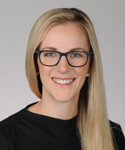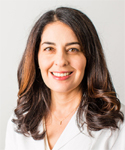 Is Work–Life Integration Within Reach for Rheumatologists?
Is Work–Life Integration Within Reach for Rheumatologists?
SAN DIEGO—Burnout in medicine has led many in the rheumatology profession and healthcare systems struggling to retain their staff to pay increased attention to work–life balance. In a session titled Work–Life Integration for the Rheumatology Workforce during ACR Convergence 2023, experts discussed a different way to approach work and life to avoid burnout.
Integration

Dr. Marvin
Whitney Marvin, MD, pediatric critical care physician and co-director of the Pediatric Physician Well-Being Program at Medical University of South Carolina (MUSC), Charleston, prefers to focus on work–life integration.
“Balance invokes a binary opposition between work and life, where one is in competition with the other,” she said. By contrast, integration is about synergy between work and career, home and family, health and well-being—integrating work and life to complement and support each other and allow space for both.
“Why do we care about this?” Dr. Marvin asked. Because it directly affects burnout and engagement.
Dr. Marvin is principal investigator for a comprehensive initiative at MUSC, supported by the Duke Endowment and conducted in collaboration with the South Carolina Hospital Association. The initiative seeks to evaluate and build a thriving hospital workforce by transforming workplaces, with MUSC as the incubator. MUSC will pilot, test and evaluate the program for other hospitals in the state.
What Is Important?

Dr. Yazdany
Jinoos Yazdany, MD, chief of the Division of Rheumatology, University of California San Francisco, explored how a productive relationship between work and non-working life may affect the practicing rheumatologist. She described herself as a woman, immigrant, mother of two, wife, daughter, sister, researcher and clinician who tries hard to integrate all these aspects of who she is into work and life. However, she has suffered from burnout and has not always achieved the optimal work–life balance she seeks.
Dr. Yazdany highly values nightly dinners with her family. Thus, she does not accept appointments in the evenings, even if that means missing important networking and social opportunities. She also zealously protects her two to three weekly yoga classes and saves her Fridays for writing papers and grants.
The research literature says burnout is common and rising; more than half of physicians report symptoms. A Medscape survey cited by Dr. Yazdany found rheumatology’s burnout rate—at 46%—is in the middle of medical specialties. However, the survey found important gender differences in rheumatology, with 59% of women and 38% of men affected by burnout.1
Gender disparities suggest women, particularly those with young children, will have a harder time achieving work–life balance.
The literature is sparse about burnout in rheumatologists, but the studies are consistent, Dr. Yazdany said. Identified causes of burnout include bureaucratic tasks, long hours, electronic medical records, insufficient compensation and lack of autonomy on the job.2
The next generation of medical residents (i.e., Gen Z, individuals born after 1996) may arrive with a new set of expectations about work–life engagement, such as awareness, resources and support for mental health issues; and the need for greater flexibility in their jobs and hours, Dr. Marvin said.
Appreciative Inquiry & Essentialism
Dr. Yazdany recommended two tools to help rheumatologists and their programs support better work–life integration: appreciative inquiry and essentialism.
In The Thin Book of Appreciative Inquiry, author and change management consultant Sue Annis Hammond proposes an organizational change philosophy called appreciative inquiry, which identifies and builds on strengths within an organization to foster positive change, rather than a deficit-based analysis emphasizing its gaps and deficiencies.3
Appreciative inquiry assumes that whatever you want more of likely already exists within the organization. The individual can ask questions, such as:
- Can you name something that went well today?
- What was a recent success at work?
- What makes you proud to work here? and
- Have you noticed a colleague who has gone above and beyond this week?
In Essentialism: The Disciplined Pursuit of Yes, author Greg McKeown promotes the relentless pursuit of less but better, with a recognition that few things in our lives are truly essential.4 It is better to repeatedly ask:
- Am I investing in the right activities?
- How can I get the right things done rather than get more done? and
- What do I care about the most?
But Dr. Yazdany acknowledged this focus can be challenging to maintain without self-discipline and a plan, as well as continuous reevaluation.
Dare to say no—firmly, resolutely and gracefully—to requested activities and commitments that don’t align with your identified priorities, Dr. Yazdany noted. Learn to say, “Thank you so much, but my dinner plate is so full right now.”
This approach may be harder for residents and other medical trainees, who feel they must answer to the demands of their programs and teachers. Perhaps a mentor can help the trainee find a way to navigate these demands.
“I agree that we ask doctors to do the impossible, although I also agree we have made some progress,” Dr. Yazdany said. She thinks we need workplace policies similar to those of Sweden’s or Canada’s, which allow new parents to spend more time with their infant children without career consequences.
Ultimately, changing the institutional culture and getting the institution behind the changes is essential, she said. What can physician leaders do to help this evolution? A wide range of strategies has been proposed to combat burnout, but one of the strongest contributors to work–life satisfaction is the support of colleagues.
Larry Beresford is a medical journalist in Oakland, Calif.
References
- Bagget SM, Martin LK. Rheumatologist lifestyle, happiness & burnout report 2022. Medscape. 2022 Feb 18. https://www.medscape.com/slideshow/2022-lifestyle-rheumatologist-6014785?icd=login_success_email_match_norm.
- Tiwari V, Kavanaugh A, Marin C, et al. High burden of burnout in rheumatology practitioners. J Rheumatol. 2020 Dec 1; 47(12):1831–1834.
- Hammond SA. The Thin Book of Appreciative Inquiry. Oregon: Thin Book Publishing Company; 2013.
- McKeown G. Essentialism: The Disciplined Pursuit of Less. New York: Crown Currency; 2014.


